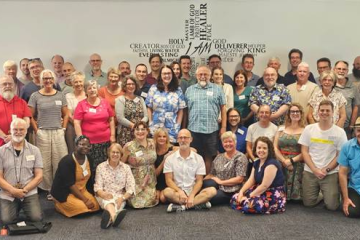May the mind… – Philippians 2:5-11, Psalm 31:9-16
When I was thinking about hymns for today’s service, the one that came immediately to mind was, “May the mind of Christ my Saviour live in me from day to day…”
It’s a beautiful hymn and a well-loved hymn and – Rebecca Hilton would approve – it’s a hymn written by a woman!
Katie Barclay Wilkinson was born in 1859 and died in 1928. Very little is known about her life except that she worked with young women in West London, and was connected to the Keswick Convention, a movement to promote deeper devotion to Christ in the Church of England. The hymn first appeared in print in 1913, as a poem.
What I discovered this week however is that the hymn was originally written as a daily devotional. It has six verses, one to use as a focus for prayer and reflection each day of week – Monday to Saturday – before coming to worship with others on Sunday.
Many people in this church use daily devotionals. A few years ago, we focused on these, particularly recommending Pray as you go https://pray-as-you-go.org/ I still recommend Pray as you go – but even more the practice of taking time, regularly, to pray and read the Bible. If you want a deeper relationship with God – this is the way to do it!
Some in this church pray and read the Bible together on Zoom each weekday morning at 8 – just for 30 minutes – and this is a wonderful time together. Anyone is welcome to join – and you don’t have to come every day – just when you can.
But this week is a special week in the Christian calendar. And so, we have more opportunities to pray and hear Scripture, to enter more deeply into the events of Holy Week – there will be Zoom prayers at 8am and 6pm Monday, Tuesday, Wednesday, a Maundy Thursday Service (please RSVP by tomorrow!), our Good Friday Service – and Easter Sunday.
But I have also written this sermon as a daily devotional (copies were emailed this morning and there are paper copies at the back) – another way for us to journey through Holy Week together.
Monday
We begin with verse five: “Let the same mind be in you that was in Christ Jesus…”
The verse challenges us to be more like Jesus, and if we go back to the start of chapter two, we see that ‘being more like Jesus’ means encouraging others, loving others, sharing with others, being compassionate to others, being humble among others, and more focused on the interests, the concerns and hopes, of others.
We cannot more Christ-like by ourselves. We need others.
And the text bears this out. The phrase ‘in you’ in verse five, “Let the same mind be in you…” is actually plural (en humin) and better translated ‘among you’. So, today I have reworded the hymn and rather than saying, “May the mind of Christ my Saviour live in me…” it says:
May the mind of Christ, our Saviour, live in us from day to day,
by his love and power controlling all we do or say.
There is a story about someone being shown a vision of heaven and hell. Hell was a room with a large pot of stew in the middle, and around the pot were sitting people who were starving and desperate. They were all holding spoons with long handles which could reach to the pot, but because the handles were so long, they could not get the stew into their mouths. Their suffering was terrible.
Heaven was a room that looked the same. There was a large pot of stew and people were holding exactly the same spoons, but they were well-fed and happy.
“I don’t understand,” the person seeing the vision says. “The rooms are the same.”
“It is simple,” says God. “The people in heaven have learned to feed each other.”
Are we, as a community, becoming more Christ-like, more heaven-like? Are we encouraging, loving, sharing, compassionate, humble, focused on the interests, the concerns and hopes, of others? Are we feeding each other?
Tuesday
There are two schools of thought about these verses in Philippians. One is that Paul is setting down a pattern for every Christian to follow based on the life of Christ. The other is that these verses invite us to enter a community of practice, of working out of our salvation (those words come in verse 12) in communion with our living Lord.
Commentator James Denney writes, Christians are saved “not by dwelling on the wonderful words and deeds of One who…lived some time ago, and reviving these in their imagination, but by receiving the almighty, emancipating, quickening Spirit of One who [lives and reigns] forever….So it must always be, if Christianity is to be a living religion.”
We don’t only work out our salvation in community, but we work out our salvation in this community – where we are right now – “the word of God dwelling in us richly hour by hour”.
This is a challenge for us as we emerge from this pandemic. How do we let go of the desire to ‘go back to how things were’ and find salvation practices that enable faith to live now?
It is a challenge to us as we employ new staff. How do we stop hankering for the past – past ministries and ministers – and find a way of ministering that brings life now?
May the word of God dwell richly in our hearts from hour to hour,
so that all may see we triumph only through his power.
Wednesday
Our world seems particularly ‘sick and sorrowing’ right now. We are mindful of so many in our congregation with cancer and other long-term health conditions. We are thinking of family and friends with Covid. We are grieved for those so affected by the floods and anxious about the future of climate change. And we are deeply distressed by Ukraine.
Philippians chapter 2 established a new way of being for us, as human beings. Rather than running away, insulating ourselves, from the suffering of others, we worship a God who ran towards us, who entered the depths of human life, who understands, who cares.
Michael Mayne writes, “Only the passion and death of Jesus can reconcile these two apparently irreconcilable truths: that God is in love with us, and that at some point in our lives we all experience suffering, pain and dereliction.”
Let us delve deeply into that love!
May the peace of God our Father rule our lives in everything,
that we may be calm to comfort sick and sorrowing.
Thursday
Last week we heard the beautiful story of Mary pouring out her costly perfume and here we acknowledge that Jesus is the costly perfume poured out for us. [He] “emptied himself, and took the form of a slave, being born in human likeness.”
Over the years these verses have been used to tell, for example, the poor in Latin America or women whose husbands are abusive that they should suffer like Christ rather than struggle for freedom.
They are not, however, the ones who are challenged by Christ’s example. It is those of us who hold status and power. Pheme Perkins writes, “In order to preach a gospel that centres on a crucified person and that brings persecution in its wake, such people must empty themselves.”
Can you think of a situation in which you are less powerful and must struggle for freedom? Can you think of a situation where you are powerful and must empty yourself of power so that others can experience freedom?
May the love of Jesus fill us as the waters fill the sea;
him exalting, self abasing, this is victory.
Good Friday
As John Clark mentioned two weeks ago, Jesus was not crucified because he was “a preacher who healed people and inspired them to live better lives”. Jesus was crucified because he willingly entered the lives of the oppressed and marginalised, and challenged the established powers while doing this – and by doing this.
His arrival in Jerusalem that we celebrate on Palm Sunday led directly to his crucifixion. As John said, “It was a warning. This is what happens to those who become so popular they might actually be able to do something.”
Are we prepared to run this race, facing the foe, like Jesus challenging the ongoing victories of the power of sin in our world?
May we run the race before us, strong and brave to face the foe,
Looking only unto Jesus as we onward go.
(The last day in our devotional is Saturday, but I am going to leave that reflection for you to read for yourself! – an incentive for using it! But as we gather on this Palm Sunday to remember the one who came to show us how to live, how to be part of a new community and a new creation, let me leave you with this quote from the church father, Andrew of Crete:
“Let us imitate those who have gone out to meet [Jesus] not scatting olive branches or palms in his path, but spreading ourselves before him as best we can, with humility of soul and upright purpose.” Amen.)
Saturday
Philippians 2:5-11 ends with the one who has humbled himself being exalted. “Therefore,” verse nine says, “God also highly exalted him and gave him the name that is above every name…” The name Jesus is given, is not ‘Jesus’, but the unspoken name of God, represented by the place marker, ‘Lord’. What this tells us is that in the incarnation, in Jesus’ ministry, in his death on a cross for us, Jesus truly reveals God, and the way God is.
Commentator Williams Loader writes, “At one level we have a story with a twist. Jesus did not… usurp God. Instead, he chose to do what God wanted. As a reward… God [gives] him what he had originally contemplated… he [is] called ‘Lord’ (or God). We could then trivialise it into a piece of common wisdom. Don’t be too ambitious about promotion. Do your job and see! You’ll get there!
But this skews its function. Paul is… [not saying] that the act of lowliness was just one of those things Jesus had to go through to get to the top, but something paradigmatic. It said something about the heart of Jesus and the heart of God. He is ‘Lord’ now…because God names him as representing the way of divine being.”
Having the mind of Christ will not only shape us internally as a community – but it will transform our relationship with our wider community, as we encourage others (Monday), practice together a living faith (Tuesday), pray for others (Wednesday), lay down our power and challenge oppression (Thursday) and walk with Jesus the road marked by suffering (Friday). We will also be seen as representing the divine way of being, the divine being.
May his beauty rest upon us, as we seek to make him known,
so that all may look to Jesus, seeing him alone.
Amen and amen!


